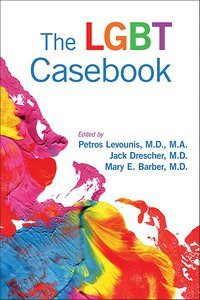The LGBT Casebook
View Pricing
Description
Even in today's more enlightened society, it takes courage for many lesbian, gay, bisexual, and transgender (LGBT) individuals to come out of the closet and embrace their sexual orientation and identity. Coming out, or facing internal and societal conflicts related to sexuality, involves a great deal of anxiety that can permeate other aspects of an LGBT individual's life—particularly when seeking psychiatric treatment. The goal of The LGBT Casebook is to help clinicians, trainees, and other mental health professionals address the mental health needs of LGBT people in the context of problems these individuals face in their everyday lives, including homophobia and discrimination.
The LGBT Casebook begins with five chapters devoted to basic concerns that affect LGBT populations, including coming out, heterosexist attitudes, the don't ask, don't tell mentality, legal issues, gay parenting, and sexual identity in patient-therapist relationships. In the rest of the book, clinician-authors present case studies of 20 patients with different DSM diagnoses, illuminating the impact of LGBT identity and illustrating a way of working with each presented patient. Features and benefits of The LGBT Casebook include:
- Insights into the unique problems LGBT people face in their everyday lives when compared with heterosexual individuals.
- Problems that are common to all LGBT individuals, such as the anxiety of being in the closet (hiding one's identity) or coming out (embracing one's identity).
- Practitioners with little experience in working with the LGBT population can gain a better understanding of psychiatric diagnoses within the context of an LGBT individual's everyday life.
- The book can be read cover-to-cover to gain insights into the full diversity of the LGBT population, or by specific chapters of interest to help with the diagnosis of a patient currently in treatment.
- A glossary at the back of the book defines both clinical and colloquial terms and phrases that clinicians and patients use to define themselves and their peers.
While The LGBT Casebook is the ideal general overview and roadmap for the clinician new to treating LGBT patients, it also provides new pearls of wisdom and insights for psychiatrists, residents, medical students, nurses, and clinical social workers who are already familiar with working with the LGBT community. By introducing a diverse range of people, diagnoses, and presenting problems, it will serve as a valuable reference book for all mental health professionals when assessing and treating the mental health concerns of lesbian, gay, bisexual, and transgender patients.
Contents
- Contributors
- Foreword
- Preface
- PART I: Basic Principles
- Chapter 1. What's in Your Closet?
- Chapter 2. Coming Out to Self and Others
- Chapter 3. From Outlaws to In-Laws
- Chapter 4. LGBT Parenting
- Chapter 5. Sexual Identity in Patient-Therapist Relationships
- PART II: Case Studies
- Chapter 6. Attention-Deficit/Hyperactivity Disorder
- Chapter 7. Substance Dependence
- Chapter 8. Schizophrenia
- Chapter 9. Major Depressive Disorder
- Chapter 10. Dysthymic Disorder
- Chapter 11. Bipolar Disorder
- Chapter 12. Panic Disorder
- Chapter 13. Obsessive-Compulsive Disorder
- Chapter 14. Posttraumatic Stress Disorder
- Chapter 15. Generalized Anxiety Disorder
- Chapter 16. Adjustment Disorder
- Chapter 17. Borderline Personality Disorder
- Chapter 18. Parent-Child Relational Problem
- Chapter 19. Partner Relational Problem
- Chapter 20. Bereavement
- Chapter 21. Occupational Problem
- Chapter 22. Identity Problem
- Chapter 23. Religious or Spiritual Problem
- Chapter 24. Acculturation Problem
- Chapter 25. Phase of Life Problem
- Glossary
- Index
Contributors
- Andrew J. Anson, M.D.
Kenneth Ashley, M.D.
Mary E. Barber, M.D.
Philip A. Bialer, M.D.
John K. Burton, M.D.
Stephan Carlson, M.D.
Kenneth M. Cohen, Ph.D.
Jack Drescher, M.D.
Laura Erickson-Schroth, M.D., M.A.
Nanette Gartrell, M.D.
Ronald E. Hellman, M.D.
Karine J. Igartua, M.D., C.M., F.R.C.P.C.(C)
Dickson Jean, M.D.
Helene Kendler, L.C.S.W.
Robert M. Kertzner, M.D.
Steven Joseph Lee, M.D.
UbaldoLeli, M.D.
PetrosLevounis, M.D., M.A.
Vittorio Lingiardi, M.D.
Lorraine Lothwell, M.D.
Anthony Lujack, M.D., J.D., M.S.
Scot G. McAfee, M.D.
Christopher A. McIntosh, M.D.
Nicola Nardelli, Psy.D.
Aaron Patterson, M.D., M.B.A., M.A.
Jennifer C. Pizer, Esq.
Daniel Safin, M.D.
Ritch C. Savin-Williams, Ph.D.
David K. Schwing, L.C.S.W.
Shane S. Spicer, M.D.
Serena YuanVolpp, M.D., M.P.H.
KhakasaWapenyi, M.D.
Eric Yarbrough, M.D.
About the Authors
Petros Levounis, M.D., M.A., is Director of the Addiction Institute of New York; Associate Chair for Clinical Services in the Department of Psychiatry and Behavioral Health, and Chief of the Division of Addiction Psychiatry at St. Luke's and Roosevelt Hospitals; and Associate Clinical Professor of Psychiatry at Columbia University College of Physicians and Surgeons in New York, NY.
Jack Drescher, M.D., is Clinical Associate Professor of Psychiatry and Behavioral Science at New York Medical College, and Training and Supervising Analyst at the William A. White Institute in New York, NY.
Mary E. Barber, M.D., is Clinical Director of Rockland Psychiatric Center and Assistant Clinical Professor of Psychiatry at Columbia University College of Physicians and Surgeons in New York, NY.
Related Products
Carousel Control - items will scroll by tabbing through them, otherwise arrows can be used to scroll one item at a time








